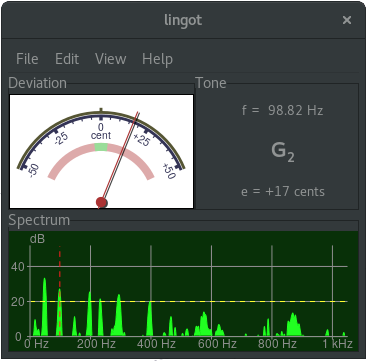Musical instrument tuner

LINGOT is a musical instrument tuner. It’s accurate, easy to use, and highly
configurable. Originally conceived to tune electric guitars, it can be used to
tune other instruments.
It looks like an analogue tuner, with a gauge or strobe disc indicating the
relative shift to a certain note, determined automatically as the closest note
to the estimated frequency.
If you are building a release, just type:
./configuremake install
If you are building a development version obtained from our VCS you will first
need to create the configure script, by calling:
./bootstrap
The supported audio systems (alsa, oss, jack, pulseaudio) and the Fast Fourier
Transform libfftw library can be enabled/disabled
independently via options passed to the configure script. The following
command displays all options and defaut value.
./configure --help
Below a summary of the packages needed to build a development version on
Debian-based systems:
sudo apt-get install \intltool \libasound2-dev \libcunit1-dev \libfftw3-dev \libgtk-3-dev \libjack-jackd2-dev \libjson-c-dev \libpulse-dev \libtool \pkg-config
Beware that LINGOT ships an experimental shared library, whose interface could
be subject to change. If you have trouble finding the library when launching the
aplication, please consider reporting a bug, and try setting the library path
to your installation location as a work-around:
LD_LIBRARY_PATH=/usr/local/lib lingot
lingot [-c config]
The -c option causes the search of a file named {config}.conf in the~/.config/lingot/ folder. For example:
lingot -c bass
will take the configuration file ~/.config/lingot/bass.conf. This is useful
for maintaining different configurations for different instruments. It’s also
possible to load and save configuration files from the GUI. The default
configuration file is ~/.config/lingot/lingot.conf.